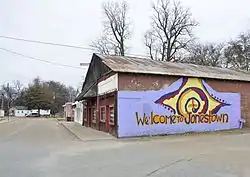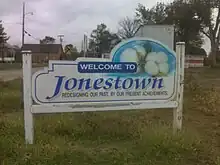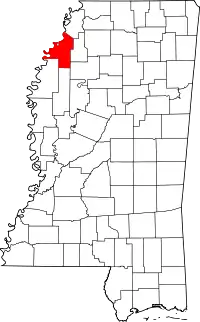Jonestown, Mississippi | |
|---|---|
 Church Street in Jonestown | |
 Flag | |
 Location of Jonestown in Coahoma County, Mississippi | |
 Jonestown, Mississippi Location in the United States | |
| Coordinates: 34°19′19″N 90°27′21″W / 34.32194°N 90.45583°W | |
| Country | United States |
| State | Mississippi |
| County | Coahoma |
| Area | |
| • Total | 0.39 sq mi (1.00 km2) |
| • Land | 0.39 sq mi (1.00 km2) |
| • Water | 0.00 sq mi (0.00 km2) |
| Elevation | 174 ft (53 m) |
| Population (2020) | |
| • Total | 962 |
| • Density | 2,485.79/sq mi (958.79/km2) |
| Time zone | UTC-6 (Central (CST)) |
| • Summer (DST) | UTC-5 (CDT) |
| ZIP code | 38639 |
| Area code | 662 |
| FIPS code | 28-36800[3] |
| GNIS feature ID | 0672011[2] |
Jonestown is a town in Coahoma County, Mississippi, United States. Per the 2020 census, the population was 962.[4]
History
The Matagorda Plantation, located north of Jonestown, was established by Colonel D.M. Russell and his wife before the Civil War. Matagorda was named after a special variety of long-staple cotton raised there.[5]
Jonestown was a stop on the Mobile & North Western Railroad, completed from Jonestown to Lula in 1879. Jonestown was incorporated in 1880.[6]
In 1965, John Wing was elected mayor of Jonestown, the first Chinese-American mayor in Mississippi.[7]
Geography
Jonestown is located in northeastern Coahoma County. It is 2.5 miles (4.0 km) east of U.S. Routes 49 and 61 and 13 miles (21 km) northeast of Clarksdale, the county seat.
According to the United States Census Bureau, the town has a total area of 0.39 square miles (1.0 km2), all land.[8]
Demographics
| Census | Pop. | Note | %± |
|---|---|---|---|
| 1880 | 147 | — | |
| 1890 | 286 | 94.6% | |
| 1900 | 317 | 10.8% | |
| 1910 | 367 | 15.8% | |
| 1920 | 469 | 27.8% | |
| 1930 | 506 | 7.9% | |
| 1940 | 706 | 39.5% | |
| 1950 | 741 | 5.0% | |
| 1960 | 889 | 20.0% | |
| 1970 | 1,110 | 24.9% | |
| 1980 | 1,231 | 10.9% | |
| 1990 | 1,467 | 19.2% | |
| 2000 | 1,701 | 16.0% | |
| 2010 | 1,298 | −23.7% | |
| 2020 | 962 | −25.9% | |
| U.S. Decennial Census[9] 2010[10] 2020[11] | |||

2020 census
| Race / Ethnicity | Pop 2010[10] | Pop 2020[11] | % 2010 | % 2020 |
|---|---|---|---|---|
| White alone (NH) | 22 | 5 | 1.69% | 0.52% |
| Black or African American alone (NH) | 1,268 | 944 | 97.69% | 98.13% |
| Native American or Alaska Native alone (NH) | 1 | 1 | 0.08% | 0.10% |
| Asian alone (NH) | 0 | 1 | 0.00% | 0.10% |
| Pacific Islander alone (NH) | 0 | 0 | 0.00% | 0.00% |
| Some Other Race alone (NH) | 0 | 0 | 0.00% | 0.00% |
| Mixed Race/Multi-Racial (NH) | 3 | 4 | 0.23% | 0.42% |
| Hispanic or Latino (any race) | 4 | 7 | 0.31% | 0.73% |
| Total | 1,298 | 962 | 100.00% | 100.00% |
Note: the US Census treats Hispanic/Latino as an ethnic category. This table excludes Latinos from the racial categories and assigns them to a separate category. Hispanics/Latinos can be of any race.
2000 Census
As of the census[3] of 2000, there were 1,701 people, 491 households, and 364 families residing in the town. The population density was 4,315.1 inhabitants per square mile (1,666.1/km2). There were 514 housing units at an average density of 1,303.9 per square mile (503.4/km2). The racial makeup of the town was 96.30% African American, 2.59% White, 0.06% Asian, 0.06% Pacific Islander, 0.24% from other races, and 0.76% from two or more races. Hispanic or Latino of any race were 0.47% of the population.
There were 491 households, of which 47.7% had children under the age of 18 living with them, 21.2% were married couples living together, 47.9% had a female householder with no husband present, and 25.7% were non-families. 21.4% of all households were made up of individuals, and 11.0% had someone living alone who was 65 years of age or older. The average household size was 3.46 and the average family size was 4.05.
In the town, the population was spread out, with 44.4% under the age of 18, 11.1% from 18 to 24, 25.0% from 25 to 44, 11.5% from 45 to 64, and 7.9% who were 65 years of age or older. The median age was 21 years. For every 100 females, there were 82.1 males. For every 100 females age 18 and over, there were 65.8 males.
The median income for a household in the town was $17,250 (in 1999 dollars), and the median income for a family was $18,958. Males had a median income of $16,146 versus $19,125 for females. The per capita income for the town was $8,258. About 49.6% of families and 52.1% of the population were below the poverty line, including 57.7% of those under age 18 and 56.3% of those age 65 or over.
Economy
Delta Oil Mill has been producing cottonseed products in Jonestown since 1942.[12]
In a 2000 study published by Mississippi State University, Jonestown was described as a community "plagued by difficult problems." Agriculture no longer supported the town as it once had, and many Jonestown residents were employed outside the community. "The direction of Jonestown has declined because of the loss of its financial independence. Citizens have been forced to seek opportunity outside of their own town. As people become more dependent on other cities, the need to stay in Jonestown diminishes."[13]
Pulitzer Prize-winning poet Charles Simic wrote in 2006:
There are towns like Jonestown, Mississippi, that in their shocking poverty make one gasp. Weathered, sagging and unpainted houses, boarded-up windows, others covered with plastic, yards full of dismantled rusty cars, their parts scattered about amid all kinds of other junk and trash, are everywhere. Idle people of all ages lounge on collapsing porches or stand on street corners waiting for something to do. In the countryside with its fertile dark soil, soybeans have become the chief crop, poultry farms are a major business, and there are nine gambling casinos in the next county. All that has increased per capita income in the region, but there was no evidence of it among the blacks I saw.[14]
Education
Jonestown is served by the Coahoma County School District. Residents are served by Jonestown Elementary School and Coahoma County Junior-Senior High School.[15]
Infrastructure
Durocher Service Program is a well-regarded benevolent organization providing social services to Jonestown residents. It is operated by the Sisters of the Holy Names of Jesus and Mary.[16] Catholic Cardinal Avery Dulles described the work of the ministry in Jonestown as "bringing hope to people on the verge of desperation."[17] In 2012, one of the program's nuns survived being beaten and stabbed during a robbery at her Jonestown home.[18]
Notable people
- W.C. Clay, blues musician and feature performer on King Biscuit Time[19]
- Luke Easter, one of the first African-Americans in major-league baseball; first baseman for the Cleveland Indians; murdered and robbed in Euclid, Ohio[20]
- George H. Lane, physician; established a Sickle Cell Center at Deaconess Hospital in Milwaukee[21]
- Oscar Reed, professional football player[22]
- Owen Whitfield, preacher and union organizer[23]
- Seelig Wise (1913–2004), a cotton and soybean farmer in Jonestown and the first Republican member of the Mississippi State Senate since Reconstruction, with service from 1964 to 1968[24]
References
- ↑ "2020 U.S. Gazetteer Files". United States Census Bureau. Retrieved July 24, 2022.
- 1 2 "US Board on Geographic Names". United States Geological Survey. October 25, 2007. Retrieved January 31, 2008.
- 1 2 "U.S. Census website". United States Census Bureau. Retrieved January 31, 2008.
- ↑ "Jonestown town, Mississippi". United States Census Bureau. Retrieved April 15, 2022.
- ↑ Mississippi: The WPA Guide to the Magnolia State. Viking Press. 1938. ISBN 9781604732894.
- ↑ Howe, Tony. "Jonestown, Mississippi". Mississippi Rails. Retrieved February 1, 2014.
- ↑ Osborn, Jeffrey (November 10, 2011). "How Asians have Clashed with U.S. Politics". Northwest Asian Weekly.
- ↑ "Geographic Identifiers: 2010 Demographic Profile Data (G001): Jonestown town, Mississippi". U.S. Census Bureau, American Factfinder. Archived from the original on February 12, 2020. Retrieved October 7, 2014.
- ↑ "Decennial Census of Population and Housing by Decades". US Census Bureau.
- 1 2 "P2 HISPANIC OR LATINO, AND NOT HISPANIC OR LATINO BY RACE – 2010: DEC Redistricting Data (PL 94-171) – Jonestown town, Mississippi". United States Census Bureau.
- 1 2 "P2 HISPANIC OR LATINO, AND NOT HISPANIC OR LATINO BY RACE – 2020: DEC Redistricting Data (PL 94-171) – Jonestown town, Mississippi". United States Census Bureau.
- ↑ "Company Profile". Delta Oil Mill. 2005. Archived from the original on August 13, 2015. Retrieved March 13, 2021.
- ↑ Criss, Shannon (2000). "Jonestown, Mississippi: 1999" (PDF). Mississippi State University. Archived from the original (PDF) on October 11, 2014. Retrieved March 13, 2021.
- ↑ Simic, Charles (2006). Memory Piano. University of Michigan Press. ISBN 0472069403.
- ↑ "Schools Archived 2017-07-04 at the Wayback Machine." Coahoma County School District. Retrieved on July 6, 2017.
- ↑ "Jonestown Family Center for Education and Wellness". Jonestown Family Center. 2010.
- ↑ Avery Cardinal Dulles (2003). Christianity and Humanitarian Action. Center for International Health and Cooperation. ISBN 9780823222889.
{{cite book}}:|work=ignored (help) - ↑ Miles, Jason (May 14, 2012). "Nun Attacked in Rural North Mississippi Home". WMCTV.
- ↑ Larkin, Colin (2013). The Virgin Encyclopedia of The Blues. Random House. ISBN 9781448132744.
- ↑ "Luke Easter". Sports Reference. Retrieved December 1, 2013.
- ↑ Sewell, George A.; Dwight, Margaret L. (1984). Mississippi Black History Makers. University Press of Mississippi. ISBN 9781604733907.
- ↑ "Oscar Reed". DatabaseSports.com. Retrieved December 1, 2013.
- ↑ Craig, Robert H. (1992). Religion and Radical Politics: An Alternative Christian Tradition in the United States. Temple University Press. ISBN 9781566393355.
- ↑ "Seelig Bartel "Bushie" Wise, September 7, 2004". Clarksdale Press Register. Archived from the original on September 4, 2015. Retrieved May 10, 2014.
External links
- Jonestown Elementary School
- Photographs by Alison Wright, part of her Third World America series
